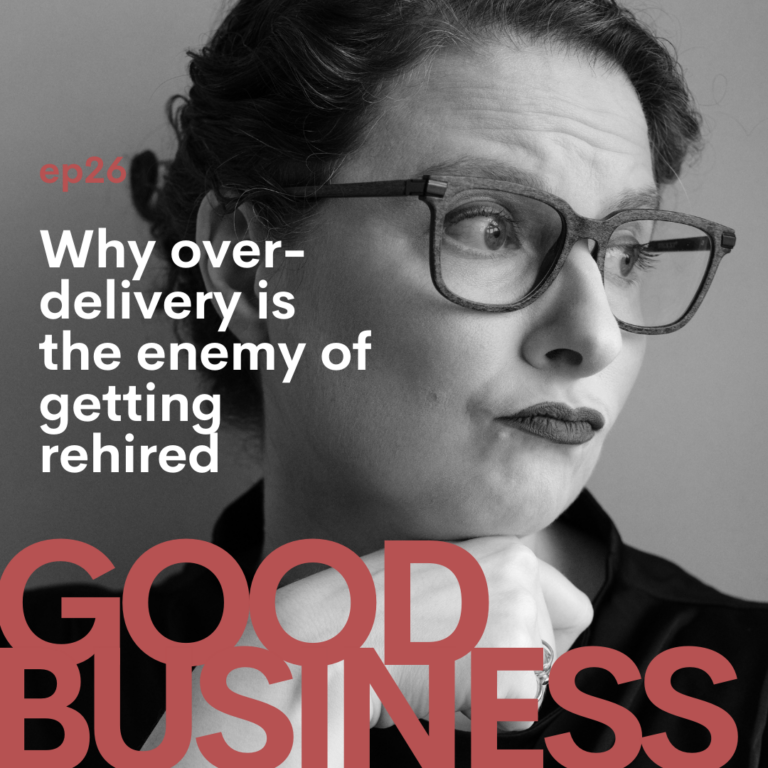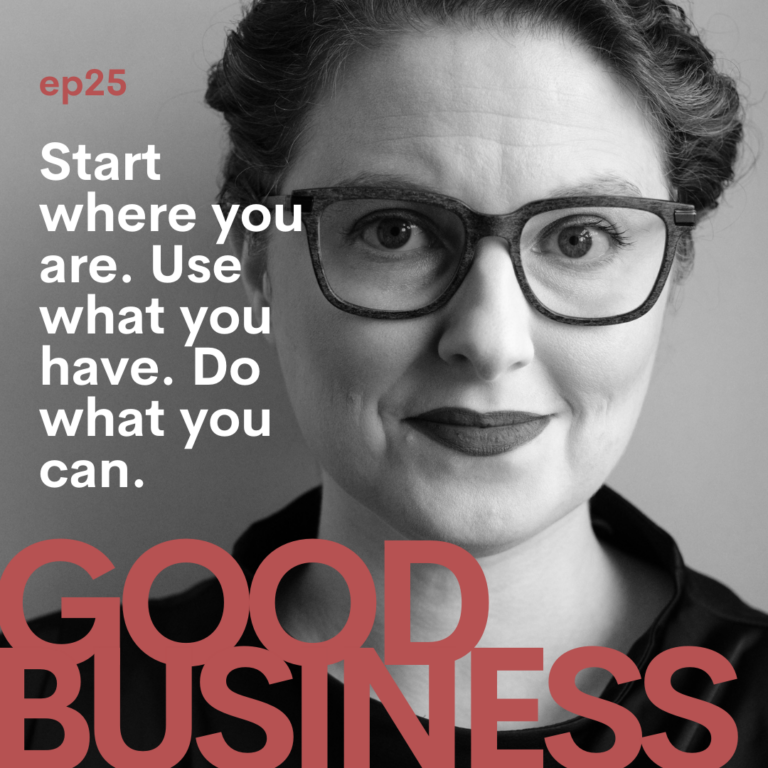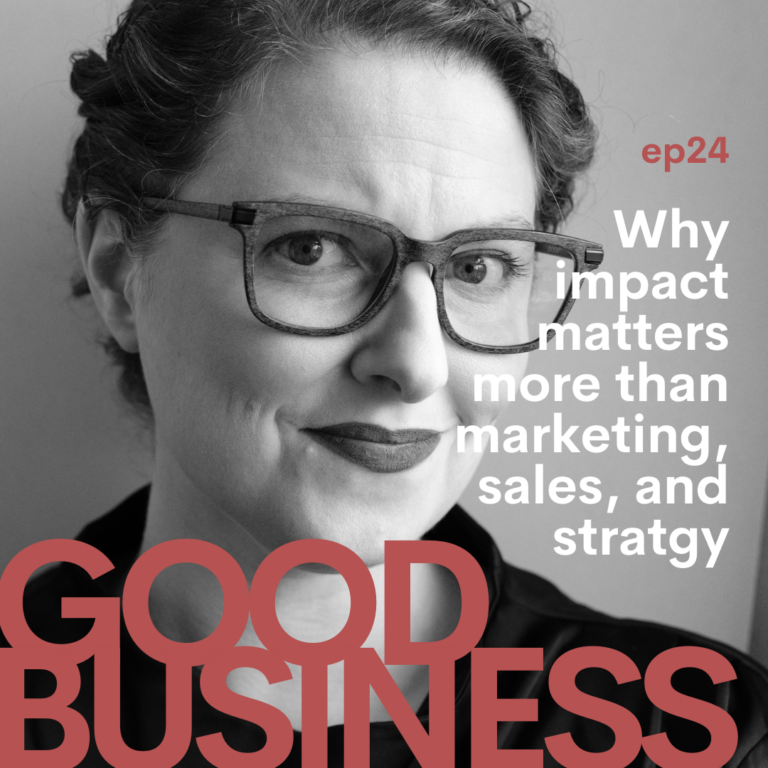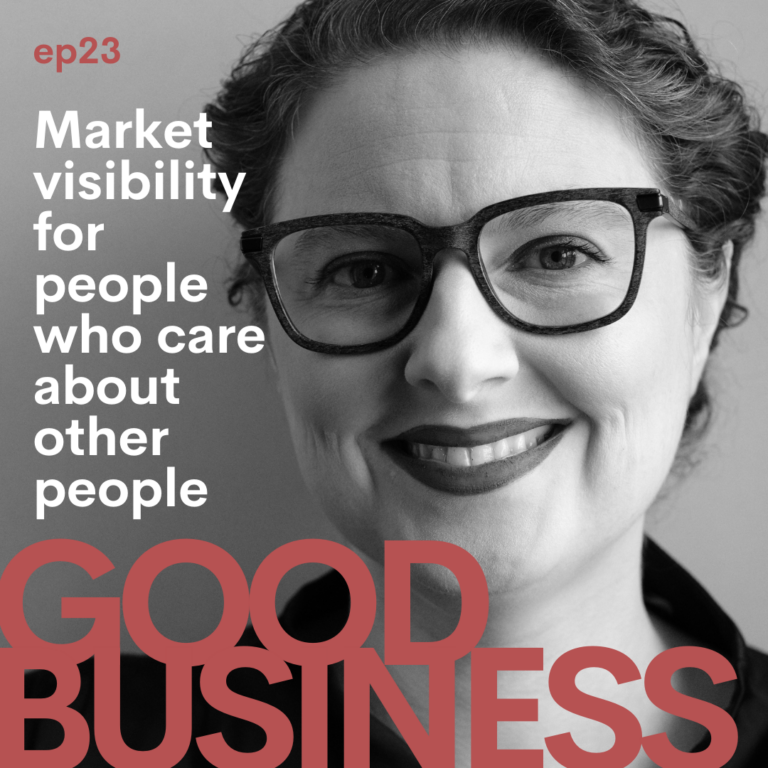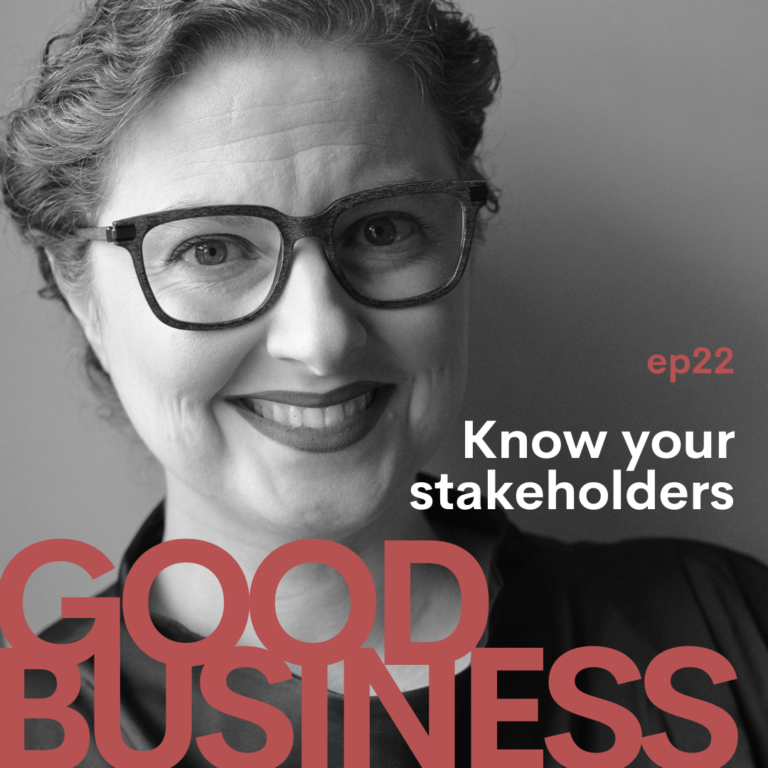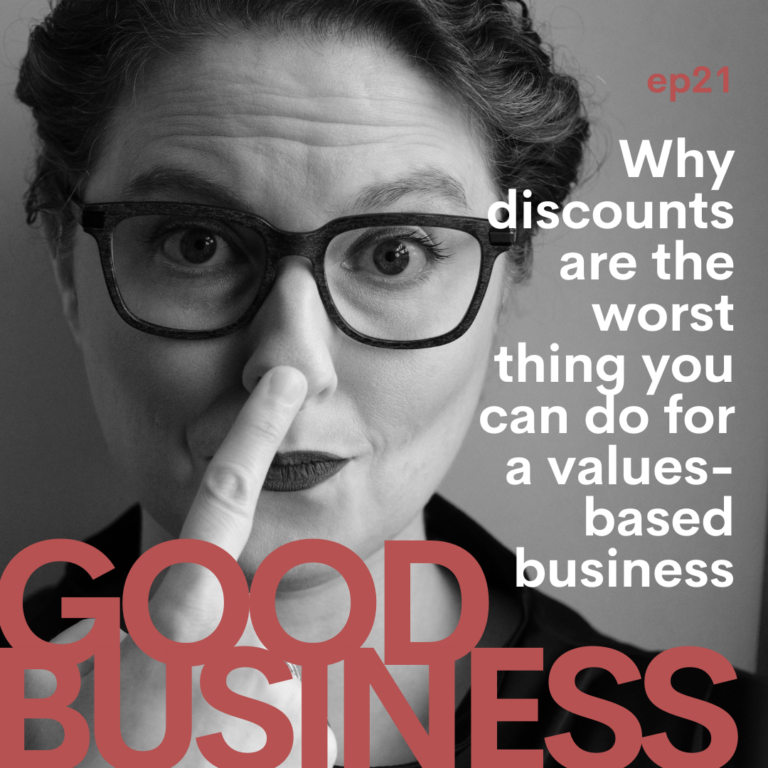Today’s episode is about one of my very favorite things to talk about. It’s the center of everything I do. Everything I teach. And everything I hope people learn from me.
Today, we’re talking about two sides of the same coin: your values and your value.
KEY POINTS:
Your values are what’s inside of you made manifest in your actions.
Your value is how OTHERS experience your values in play.
Episode Transcript:
I’m Illana Burk, CEO of Your Life’s Workshop, coach to entrepreneurs and solopreneurs across dozens of industries and host of Good Business. With nearly 20 years experience helping hundreds of clients create profitable, ethically driven and sustainable businesses based on their life’s work, I’m here to teach you how to do great work, make great money, and make a positive impact without feeling like you need a shower afterwards.
Hi there and welcome. Today’s episode is about one of my very favorite things to talk about. It’s the center of everything I do, everything I hope people learn from me, everything I teach, and it’s at the foundation of every coaching call. I’m really excited to be sharing it with a bigger audience. Today we’re talking about two sides of what is essentially the same coin, your values, and your value.
To dig into that, first, I want to define what those two things are. So your values are what’s inside. The thing that is the core of everything that you do. How you move through the world, how you do your work, and how you present it to the world. Your values are what’s inside of you made manifest in your actions.
Your value is the flip side of that. It’s how others experience your values in play. Your values are what affect your deepest work, how you make decisions, how you operate externally from yourself. It’s how you move through the choices you make, how you interact. It’s everything. They have all kinds of different names for them: your values, your morals, your beliefs, your systems of judgment. Whatever label you want to put on it, I’m using values to encompass all of that.
Most of us are a cocktail of things. We are a mix of our experiences, of our learnings, of what’s been taught to us that we didn’t even know we learned. It’s a mix of all of these different components mashed together in a cocktail I guess is the best word for it. It’s what makes you, you. How you interact with humans and how you think about your work. It’s everything. Your values are something that most of us think of as almost immovable. When you say that people can’t change, that’s what we’re talking about. Can you change your values? That’s not something most people are good at. It takes a tremendous amount of work to shift your values because they tend to defy logic as you age. As you get older and you get more set in your ways, your values become core to who you are. They get all tied up with your ego. Once things are tied up with your ego, they stop being choices and start being just who you are.
That’s a lot bigger topic than we’re going to tackle today. We’re going to talk about how this affects your work. Your values should be the foundation of everything. They should be how you do what you do. The other side of that is your value. We talked about that a little bit. Your value is how others experience your values in place. Once your values are set, and you can identify how they affect your work, then you can start to think about how they will play out in the world, in how you experience what you do and how others experience what you do. Your values affect your deepest work, how you make decisions, how you operate externally from yourself, and how you move through the world.
Your value is more complicated in some ways and simpler in others. For one thing, it’s only about 50% up to you. You can put yourself out and position yourself in a certain way to convey a certain level of value to the outside world, depending on your market. There are a thousand ways to do this, and we’ll go into it a little bit. The rest is all about perception. You can’t control how other people perceive you and your values in play. You can’t control how others value you. Not entirely. You can get about halfway there, but you can’t get all the way there. We all have to put things out to the world that we don’t necessarily get to control how it’s experienced by others.
One of the scary things, especially when you’re starting, is creating all these things, but then they might not draw in who you thought. It might not attract who you thought. It might attract people that you had no idea it would attract. That’s where there’s a lot of question marks around this and accepting that and knowing that going in can be freeing. Other things to know about what value is and what it isn’t: it can change. Your value is very deeply affected by external circumstances. It can go up, it can go down, based upon things as arbitrary as the weather. Depending on what you do, it can be affected by politics. It can be affected by world events in trickle down, ripple effect ways that you may not even be able to draw a direct line to.
It definitely will change over time. Again, sometimes when we think about how your value can change, obviously you’re still you. Value – again, I’m going to reiterate, is how the rest of the world experiences you. Your value can be shifted based on all kinds of both internal and external circumstances. Your value can increase. If you gain more education, your value can increase. If suddenly someone bigger and more successful than you say that you are great, all of a sudden your value goes up. Your stock increases. That’s the value of promotion, but it is affected most by how you invest in design, how you present yourself, how you present what you do, and how you put yourself out to the world.
When you think about building value, say you want to position yourself. The luxury market is the easiest way to convey this. It’s the easiest example of this. If you position yourself as a luxury brand, meaning you’re going to spend a fortune on design, you’re going to spend a fortune on the packaging, whatever that means for your business. You’re going to spend a fortune on promotion; you’re going to spend a fortune on those who endorse it. That’s how you position yourself as showing that you have an extremely high value. That’s one way to do it where it’s all about the gloss, the good design.
This is not a judgment; it’s just an example of how you convey the value. I think vodka is a good example of this. I remember seeing something on 20/20 years ago. A round table discussion. It was a taste test of different vodkas, and they had everything from the Lady Lee and the big plastic bottle that you buy on the discount shelves on the very bottom, right all the way up to Grey Goose and Belvedere and all the fancy ones. Without a doubt, people pretty much across the board picked the middle. Somewhere in the low middle, as being the one they liked the best, that they were certain was of the highest value, was the luxury brand, and was the best. We see all kinds of examples of stuff like this; the actual intrinsic value was related more to external circumstances like cache and packaging and beauty and a general feeling of being a part of something at a certain level. That’s how people value it.
Even though this is wildly understood, we will still operate against our self-interest, meaning we’re going to spend more to feel like we’re getting something better. Every luxury product is built on this same concept. Very few luxury products have higher quality, like physical quality than anything that was less so.
How your values interplay with your perceived value from the outside is what are you willing to do. How are you willing to express yourself to the world? Those are questions that are deep, and they’re hard. So I’m going to keep moving on, and we’ll circle back to that in a moment. Here’s the thing you need to remember about value. If it’s not accurately conveyed, you’re dead in the water. If you convey someone else’s value in your marketing and your social media presence and how you put yourself out to the world, if they’re not your values, it’s like the world can smell it and you won’t be able to move forward.
That’s hard for a lot of people to understand if you haven’t examined closely what your values are, as they pertain to your business. You want to think about how your values dictate your value, how they convey that. Some examples of that are where your website is hosted. It can be as simple as that. I saw a potential client was sending me their information the other day and I noticed at the bottom of their website, and this is an extremely high-end luxury product, the bottom of their website said proudly hosted by Go-Daddy. Now, love Go-Daddy, hate Go-Daddy, not the point. They’re conveying they’re going to charge thousands and thousands of dollars for something, and they went with the free hosting plan at a company who has some pretty seriously questionable values.
What does that say? What does it say about them? What does that say about their value? Well, it can be subtle. You know, chances are, I might be the only person that ever even noticed that, but what if I’m wrong? What if that’s not the case? What if you, their potential clientele, couldn’t even afford 100 bucks a year for hosting? If you’re hosting on Go-Daddy, you’ve picked the easiest. I don’t know that I want to hire a luxury brand who picks the easiest thing who picks the free thing. I’m going to give you thousands of dollars. That’s the best you could do? So you can damage your value in subtle ways if you’re not making deliberate choices. Other things that convey similar information, like how much you spend on design, how good your photography is, and how you promote others.
That’s a big one. If one of your core values is you want to promote other people, you want to lift others, but you don’t invest any time or energy promoting other people, then you’re not conveying that value and that’s affecting YOUR value, both to those people who you might promote and also your perceived value to the people that you might potentially want to work with. Other things include how you use your power, how you use your social capital, how you use your business, and your work to convey your message. I don’t just mean your work message. I mean your human message. Politics are a good example of this. How often do you get to say politics are a good example of anything? Anyway, the way you use your brand can do all kinds of different things.
If a core value for you is social equity and equality, but you don’t talk about politics in your business, what you’re saying is your value to someone who deeply cares about social justice and politics is lower. If you want to work with people who care deeply about social justice and politics, then you need to make sure you’re conveying through the power of your business. That’s how your values become manifest in your value. Now, if you are trying for a broader market for example, where you don’t necessarily want social justice to be a core value point in how people hire you and in their buying decisions, then you might choose not to talk about politics in your business. You might choose not to draw those lines in the sand.
This is not a judgment on whether or not you should. That’s a conversation for another day. This isn’t about that today. This happens to be a polarizing neighborhood. So it’s an easy one to choose for an example to illustrate my point. Core to all of what I’m talking about is how you sell. Your values come through loudest in how you sell whatever it is you sell. It comes through most resonant when someone’s making a buying decision. When you think about selling, when you think about how you present yourself, how you want people to spend money on you, then you have to think about what matters to you. I’m going to pull away from using the term “your values” for just a minute and think about more what matters to you.
This is where the age-old golden rule comes in. I’m not a big believer, but the golden rule is to treat others how you want to be treated. See, here’s the thing about that. You have to treat others how THEY want to be treated to have empathy be a part of your core value set. A lot of people don’t ever think about that. It’s something I’ve thought about a lot as an adult in my journey for growth and being fully fleshed out. A leader, especially if I want to be empathetic and I want to meet them where they are, and I want to look at my potential clients and friends and loved ones eye to eye instead of from a place of ego, I have to look at what they ask of me. This podcast is a great example of that. I may never have started a podcast were it not for the fact that the people I most want to serve asked me to.
It was something I heard again and again and again and again and again. The people I respect most were like, “you’ve got to have a podcast. We want to hear your voice. We want to hear your lessons. We want, and more people should have access to that.” It was a huge honor. It’s a huge compliment to have people ask you for your knowledge and your expertise. This is how I applied that; give the people what they want. If that’s the way they want to consume information from me, then that’s the choice I have to make, and I have to get over my own biases, and I have to get over my objections because it’s important that I treat my people how THEY want to be treated. That all ties into the idea of values. If it’s a core value for me, then my behavior has to match it. It means learning how to take responsibility both for your failures and your successes. It’s learning how to take responsibility for the power that you have and making sure that you are conveying with honesty and integrity and authenticity.
It’s making sure that the way you present yourself to the world aligns with what you believe. Taking the time to stop and think about it, really think about that. When was the last time you thought about whether your business and every single choice you make within it aligns with your values? Now, I want to point out, in our last episode we talked a lot about how it creates shame, and whether or not you create the idea in some of the selling patterns we talked about, around scarcity and that sort of thing. If you haven’t listened to that episode yet, that’d be a good next stop. Where I’m going with this, is if you are only taking advice on how to sell and you’re not thinking about whether those choices you’re making align with your values as a human being, you’re not creating authenticity.
Everybody knows that you should be authentic, right? I want to be authentic. Everybody wants to be authentic, but nobody has any fucking idea what authentic means, in my mind. That’s what authentic means. It means you are deliberate in how you sell. It means you’re paying attention, that when you get advice, when you get maybe a new thing, or someone goes, maybe you should start a YouTube channel. Does every single piece of that aligned with your values? That’s how you make decisions. That’s how you think about whether or not what you create to the world is going to have the high value you want it to.
That’s how you decide. Does it align with your values, and does it treat people the way they want to be treated in your community? Think about that. If you’re somebody who, let’s add, you’re a life coach, and you most want to help people have confidence, and you’re using a marketing funnel set of tactics where you’re creating scarcity, urgency and or shame or fear of missing out as part of how you sell. You’ve already lost because you’re not creating and you’re not offering them value. You’ve created a problem that they perhaps might not have already had. You’re not giving them more confidence. You’re not giving them more courage by creating emotions that trigger a buying choice. Instead, why not give them an opportunity for empowerment through your sales cycle? Why not give them credit for being a fully baked human being and feel lifted by the experience of purchasing from you? Give them agency, give them the ability to be courageous in their choices, without shame, without making them feel like they only have five minutes to choose.
That’s where alignment comes in. That’s what real authentic alignment looks like, as far as I’m concerned. The way to think about that is how do you sell versus how are your values? How do your people want to be sold to? That’s where it’s when we think about selling, when we think about sales, when we think about consent, it’s okay. It’s okay to put it out there that you’re selling something. You’re allowed to sell things, and people are allowed to buy things. The alignment happens when you sell something that’s of only the value that it is no more, no less. If something can legitimately change someone’s life, then say that. If it can’t, then say that too, it’s okay to be honest, and it can be refreshing and extremely effective. That’s how you create value.
That’s how you put value out there. This is a lot deeper. It’s really hard to figure out because most of us have no idea how values and our value align. To figure it out, you have to do a lot of pretty heavy fricking soul searching. You have to think about what are the things that matter most to me? What are the things that I’m willing to let go of that might be core to who I am, and how do those things align with my work? If they don’t, you won’t make it. You’ll get bored. You’ll pull away, you’ll feel misaligned, and you won’t have clients. That’s everything. I’ve seen people who on the outside do everything right. They spend all the right money, they hire all the right people, they make all the right moves, and yet they still don’t make any money.
People still don’t resonate with their message because their values don’t align with their value. They’re trying to sell something, not trying to offer something to the world based on how their values are made manifest out in the universe.
I’m going to leave this as a simple message today. There’s a lot to be said. There’s a lot to be dug into. There’s a lot to think about, and I want to leave this at a core, simple, clean, “this is what it is.” Have you thought about this lately? Chew on it for a while. I’m not going to say any more words about it. Maybe we’ll do a followup episode down the road digging deeper into each of these things. It’s something I talk about a lot. I would imagine it’ll bleed into other episodes, too. For the time being, that’s where we’re going to leave it. Your values are what’s inside of you made manifest in your actions, and your value is how others experience your values in play.
Thanks so much for hanging out with me today. For more information, visit www.thegoodbusiness.co or www.lifesworksdev.wpengine.com.
More Episodes
Why overdelivery is the enemy of getting rehired | GB26
Today’s episode is all about why over-delivering is a really good way to not get asked back for more work. We all think doing our best and giving more than people asked for is a good thing. And in some ways, it is. Things like adding extra value to something you do is fine. What I’m talking about is when you completely blow the scope of what was asked of you out of the water. It’s one of the hardest things to identify when you’re trying to figure out why no one seems to hire you twice.
Start where you are. Use what you have. Do what you can. | GB 25
Today’s episode of The Good Business Podcast is all about my very favorite quote in the whole world. “Start where you are. Use what you have. Do what you can.” by Arthur Ashe
Why impact matters as much as marketing, sales, or strategy. Maybe more. | GB24
Today’s episode is less of a lesson than recent episodes. Instead, today we’re making a case for a topic we’ll be talking a LOT more about in the future: IMPACT. What it is. Why it matters. And how to pay attention to it.
Market visibility for people who care about other people | GB23
Today is a branch off of our stakeholder conversation. If you listened to that episode, you should have a clear picture of exactly who matters to you and your work and why, as well as how much time you have for your work without sacrificing what those VIPs need and expect from you. Next up, we talk about exposure, protection, and the responsibility you have to those who matter most.
Know Your Stakeholders | GB22
In this episode, I’m going to walk you through how to think about establishing your stakeholders, the steps you need to take to do so, and how to make decisions based on who they are without compromising those big fat dreams we’ve been talking about.
Pricing Basics: Why discounts are almost never a good idea | GB21
Today’s episode dovetails on our last one, where we talked all about how your value isn’t determined by your price tag. Today, we’re talking about discounts. First, we’ll talk about why businesses offer them, what their purpose is and when they ARE a good idea. Then we’ll talk about why they are probably a bad idea for you and what to do instead.

